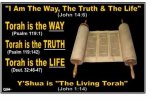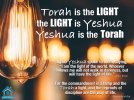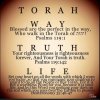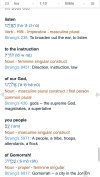RE: My assertion (again) that Yochanan, and his Brother, spoke Hebrew and Aramaic (i.e., in Revelation, too) and that he didn't write his Book or letters in Greek, but his native language.*
He most certainly did. The word logos is highlighted....
...in the Greek translation.
My point is not to argue ad infinitum, but to note that the words ('debarim,', debar singular) used, and the fact that He (Who-ever, but He is after all
echad) spoke the world into existence all bear on a common concept. "Word" is certainly an English rendering, and does not carry the exact same connotation as either the Hebrew word, or the implications that the application of His 'debarim' to provide Instruction might carry.
Note, for just one example, that the actual rendering of "Ten Commandments" from the Hebrew is "10
debarim" which more literally means the 'ten words,' or even 'ten sayings.'
Nor am I claiming that we REALLY know what it means that He said things like
"let there be light," or whether we would have heard words (arguably not English, or Greek) or just some primordial 'sound' (and I don't know whether that meant phonons or photons...they don't seem to have been quite created yet...

)
What I do believe the 'totality of His Word (and in THIS case that is synonymous with His Instruction, I suggest) speaks to the fact that it is ALSO synonymous with His 'character' and what we can know of that.
Addenda: Anything more gets to be "too metaphysical." But I think that the evidence of what Yahushua DID, so clearly even in His First Public Address, starting in Matthew 5, make the point beyond doubt. He said, via His repeated 'rhetorical device', that
"you have heard it said, BUT, I TELL YOU," exactly what He, Himself, had in fact, Written. Which is about as clear as I can imagine about what it means that He was His own 'Instruction,' literally teaching them there in 'the Flesh.'
-------------------------------
* We've had a related discussion re: language before. But I think the story in Isaiah 36:11-13 is relevant in that sense.




